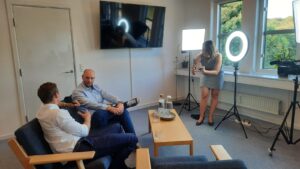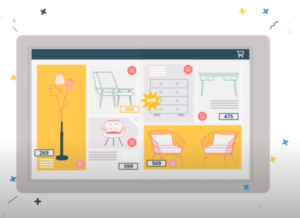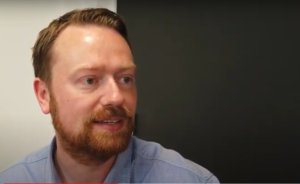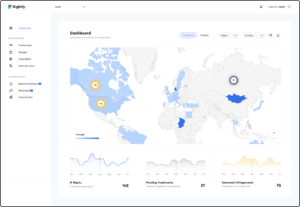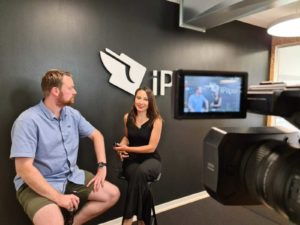The Digital Transformation Show [E4P1]: Customers at the center of iPaper, the digital catalogs business
During our talk, Mark and I discussed several issues, from the history of the company, what is a software as a service, why is it important for business to be customer-centered, and how the COVID-19 lockdown measures have impacted all kinds of digitalization companies.
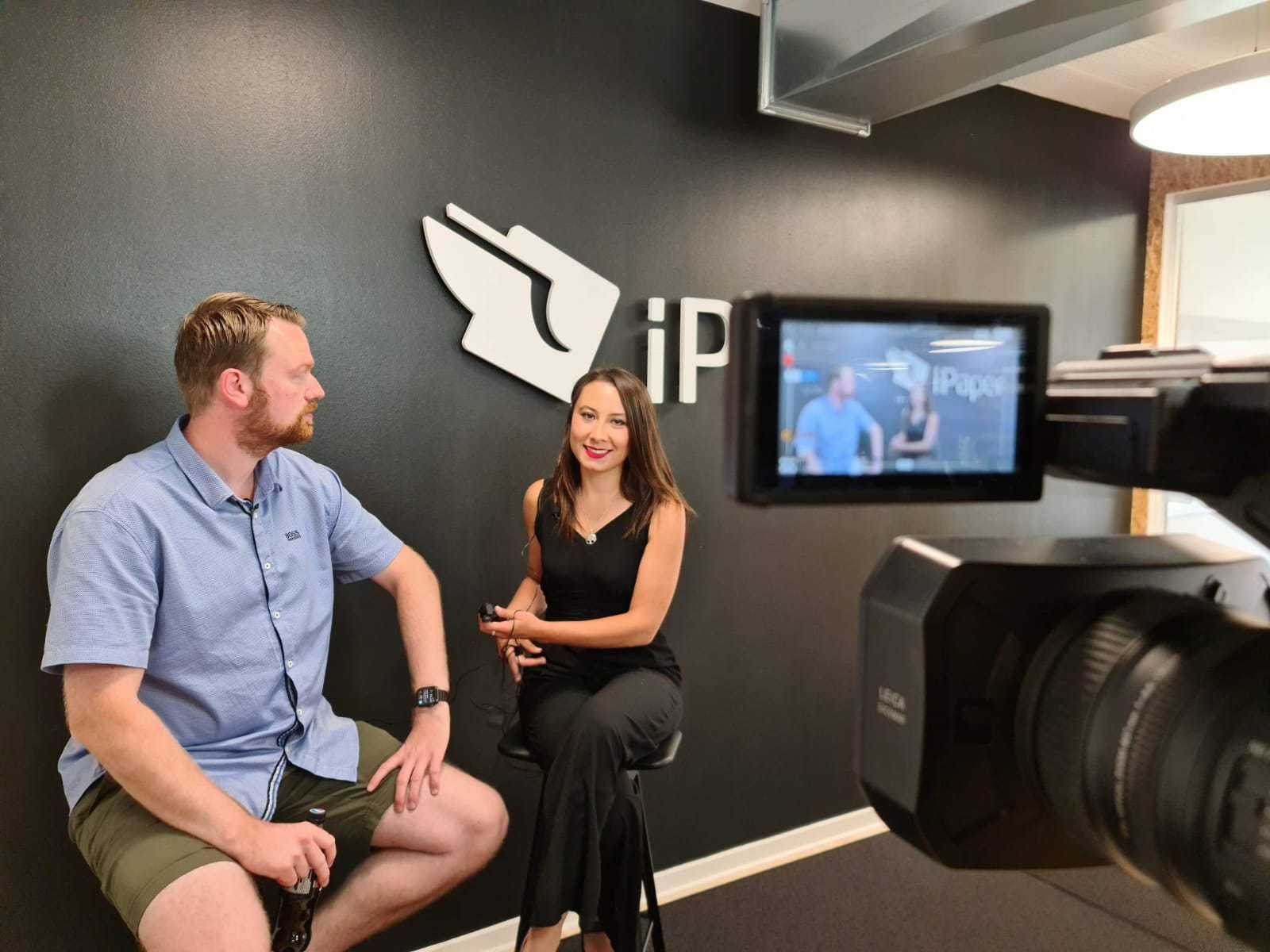
Mark Rasmussen (left) CEO at iPaper, and Estefanía Zárate Angarita (right) The Digital Transformation Show host.
I have recently joined a company called iPaper, based in Aarhus, Denmark as their Latin American Market Growth Specialist. I figured it would make a lot of sense to get back on track with The Digital Transformation Show by inviting Mark Rasmussen, CEO at iPaper, to be part of the show.
During our talk, Mark and I discussed several issues, from the history of the company, what is a software as a service, why is it important for business to be customer-centered, and how the COVID-19 lockdown measures have impacted all kinds of digitalization companies.
Check out the first part of the episode and below, the full transcription.
The Digital Transformation Show
Estefanía zárate Angarita: Hello and welcome to one more episode of the Digital Transformation Show! After a long pause during this pandemic we are finally back and today I am very happy and very glad to introduce to you Mark, the CEO of iPaper, a company also headquartered here in Aarhus, Denmark. So, hello, Mark.
Mark Rasmussen: Hello.
E: How are you?
M: I’m good, thanks.
E: How is this pandemic affecting your company so far.
M: So, what is bad for the world is kind of good for us. We have seen a lot of companies who traditionally use offline media, they have been forced to think alternatively since shops are closed, they can’t come into malls, they gotta think digitally, and we are definitely benefiting from that because we do help traditional companies going online.
E: And we see this as a trend in the digital transformation world. Let’s say that other companies that are also working with digitalization have also benefited from the actual circumstances, yeah?
M: Yes.
E: So, before we go into the details, I would like to give our audience a general approach to what iPaper actually does…
M: Sure. So we have been around for about 15 years and mainly the business that we do is we take traditional offline media, so printed catalogues, weekly leaflets… and we digitalise them. So the companies put them online, we make the interactive so you can buy directly from these catalogues, whether you are putting stuff to a basket and checking out online or, especially in Latin America, we have a lot of companies doing direct selling, so they have consultants sharing these catalogues and end consumers will add products to the basket and actually check them out over WhatsApp of similar messaging applications.
E: You mentioned, Mark, that you have been in the market for 15 years, which is quite impressive. A lot of the companies working in this field are actually struggling to go through the first couple of years. So, what’s the secret? How have you been in the market for so long?
M: So, our story goes way back. We started organically as the project of another company. This company was doing web consulting and they strung upon a goal and they started creating some brochures for some of their customers and I became part of that, I was a freelancer for the first couple of years and I pretty much helped them automate all of the processes. So we already made these catalogs as part of the other company, I started automating it and all of a sudden we had an interesting business. Fast forward a couple of years and this business, iPaper, was separated from the original company and iPaper was formed in 2008. And from there we were kind of boot-strapped, we already had an audience, we had a list of customers, we were making money and we have grown slowly but organically since then.
So for us, it was… I wouldn’t say an “easy” start but it was a simple start. We didn’t have to get funding, we were self-sufficient very quickly and our main challenge has been how to grow faster and faster based on that start.
E: Where are you standing today compared to where you were standing in 2008 in terms of business. How many customers do you have? Do you have a worldwide pool of customers= Where are you now?
M: So, no need to learn the numbers just by heart but back then we had customers in probably 2 or 3 customers, most of them based in Denmark, because that’s where we started out and I think the number of customers was probably around 50 or so. Today we’ve got customers in 60 different countries all around the world, we have gotten more than 1200 customers since 2008. So we have come quite a way since then.
E: Yes, it sounds like! You also mentioned a couple of times now that your growth has been mainly organic. So how do you explain to the audience how you manage to grow so much organically?
M: You gotta just expand upon what you are already doing, so you improve small bits, you iterate slowly, just by improving a few percent again, and again, and again. You just put on top of the base that you already have. One of the main important keys being in a software as a service business is making customers happy. If customers are not happy they are going to churn and eventually you are going to lose the business. So you can sell just as much as you want but if you don’t succeed in making your customers satisfied and happy with what you are giving them, they are gonna get out of business again.
We invest a lot in what we call “Customer Success” or “Customer Care”, so making sure that our customers succeed when they come on board with iPaper. So we not only sell them the product and let them do whatever they do, we gotta help them all the way to their success and then continue up from there. And that means that we got a customer base that is slowly growing and not shrinking by itself.
E: I find this quite interesting because precisely the idea of many companies is to keep the customer at the center of their service, and no matter if it’s a software as a service or any other type of company, but this idea of being customer-centered is something that we find as a pattern along digital transformation companies.
M: Yeah.
E: So, Why do you think it is so important for companies to be customer-centered?
M: I think there is a trend in business in general where more and more business models are moving towards services, so back in the days you will sell on an hourly basis, you will sell projects and as soon as you delivered the customer was gone, and you might pitch to them another day but pretty much as soon as you had delivered, you had no relation with the customer anymore.
But more and more things being services, whether or not they are software or they are actual physical boxes that you receive every month, groceries you receive every week, with it being a service you have this continuous focus on the customers, you do need to focus more on the customer again, and again, and again. Any single bad result from a customer will mean that you lose the business. In a traditional world, if you had a single bad relationship with a customer, that customer might not come back again but that was pretty much it; you didn’t lose any kind of ongoing business with that customer.
E: Actually many people might not know what software as a service is, it’s a not-too-new industry, I would say, but it is also not common for many people. So how would you explain what software as a service is?
M: Back in the days if you needed let’s say a website, or some kind of software, CRM system that you use inside of your company, you might pay someone to develop it for you, made specifically for you, you pretty much would get the application yourself, you would put it in your own servers, you had to host it yourself, you had to maintain it yourself and if a bug was discovered you had to pay someone to fix it for you, for you specifically. And all of this obviously had a lot of cost because it meant that you were the only one driving the change.
So software as a service is pretty much, rather than buying this for yourself, companies specialise in providing solutions; let’s say CRMs like Salesforce or a digital catalogues solution like iPaper. We specialise in just that one thing and we do it really, really well. Since we have 1200 customers we are going to find all kinds of cases, different use cases, we are going to find some bugs and we can fix all of this for all of our customers at the same time. And rather than asking other customers to make a big investment up front to own or software they just rent it every single month. It means, there is no commitment, they can try it out, and if after half a year it doesn’t work for them, they can just churn and that is perfectly okay.
E: Okay, so you work on a subscription base…
M: It’s a subscription, yeah. It is.
